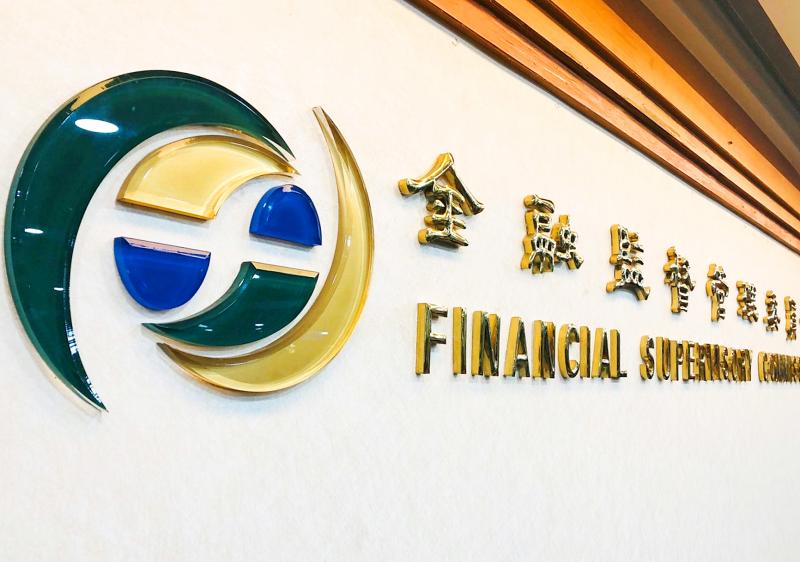Taiwan’s banks are to undergo mandatory climate-change stress tests for the first time next year to measure the impact of a range of possible environmental catastrophes on the lenders’ assets.
The tests’ content would be finalized before the end of this year, Banking Bureau Deputy Director-General Roger Lin (林志吉) said in an interview on Tuesday.
The Financial Supervisory Commission plans to conduct the tests in the first half of next year with the results to be published in June.

Photo: Kelson Wang, Taipei Times
The commission has authorized Taiwan’s banking association to develop the tests, which it is to receive for approval by the end of September.
Some institutions, including CTBC Financial Holding Co (中信金控), Fubon Financial Holding Co (富邦金控) and Cathay Financial Holding Co (國泰金控), have already begun to prepare, examining the risks to real-estate assets of rising sea levels or to loan portfolios exposed to industries especially vulnerable to climate change, statements on their Web sites say.
Climate change and government policies aimed at mitigating it are growing priorities for financial authorities around the world.
The Bank of England last month warned that British banks and insurers could see climate-related losses of as much as £334 billion (US$419 billion) over the next three decades following the central bank’s first-ever stress tests.
Not everyone agrees.
Stuart Kirk, the head of responsible investing at HSBC Holdings PLC’s asset management unit, criticized environmental “hyperbole” at an event hosted by the Financial Times last month, saying that climate change is not a financial risk worth worrying about.
His comments have since been widely condemned, and HSBC has suspended him.
Taiwan stands to be particularly hard hit by unmitigated climate change. Higher temperatures portend stronger typhoons and more severe droughts, the Ministry of Science and Technology said in March.
They could also threaten as much as 20 percent of the rice harvest and encourage the breeding of yellow fever mosquitoes, which can spread Zika, dengue fever and other diseases.

TRADE WAR: Tariffs should also apply to any goods that pass through the new Beijing-funded port in Chancay, Peru, an adviser to US president-elect Donald Trump said A veteran adviser to US president-elect Donald Trump is proposing that the 60 percent tariffs that Trump vowed to impose on Chinese goods also apply to goods from any country that pass through a new port that Beijing has built in Peru. The duties should apply to goods from China or countries in South America that pass through the new deep-water port Chancay, a town 60km north of Lima, said Mauricio Claver-Carone, an adviser to the Trump transition team who served as senior director for the western hemisphere on the White House National Security Council in his first administration. “Any product going

STRUGGLING BUSINESS: South Korea’s biggest company and semiconductor manufacturer’s buyback fuels concerns that it could be missing out on the AI boom Samsung Electronics Co plans to buy back about 10 trillion won (US$7.2 billion) of its own stock over the next year, putting in motion one of the larger shareholder return programs in its history. South Korea’s biggest company would repurchase the stock in stages over the coming 12 months, it said in a regulatory filing on Friday. As a first step, it would buy back about 3 trillion won of paper starting today up until February next year, all of which it would cancel. The board would deliberate on how best to effect the remaining 7 trillion won of buybacks. The move

China’s Huawei Technologies Co (華為) plans to start mass-producing its most advanced artificial intelligence (AI) chip in the first quarter of next year, even as it struggles to make enough chips due to US restrictions, two people familiar with the matter said. The telecoms conglomerate has sent samples of the Ascend 910C — its newest chip, meant to rival those made by US chipmaker Nvidia Corp — to some technology firms and started taking orders, the sources told Reuters. The 910C is being made by top Chinese contract chipmaker Semiconductor Manufacturing International Corp (SMIC, 中芯) on its N+2 process, but a lack

NVIDIA PLATFORM: Hon Hai’s Mexican facility is to begin production early next year and a Taiwan site is to enter production next month, Nvidia wrote on its blog Hon Hai Precision Industry Co (鴻海精密), the world’s biggest electronics manufacturer, yesterday said it is expanding production capacity of artificial intelligence (AI) servers based on Nvidia Corp’s Blackwell chips in Taiwan, the US and Mexico to cope with rising demand. Hon Hai’s new AI-enabled factories are to use Nvidia’s Omnivores platform to create 3D digital twins to plan and simulate automated production lines at a factory in Hsinchu, the company said in a statement. Nvidia’s Omnivores platform is for developing industrial AI simulation applications and helps bring facilities online faster. Hon Hai’s Mexican facility is to begin production early next year and the